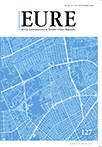La "era urbana" en debate
DOI:
https://doi.org/10.4067/S0250-71612016000300013Palabras clave:
era urbana, Kingsley Davis, población urbana, transición urbana, urbanización planetariaResumen
Las observaciones premonitorias sobre las tendencias urbanas del mundo contemporáneo traspasan el discurso académico, político y periodístico de principios del siglo XXI. Entre las más citadas se encuentra la afirmación según la cual vivimos hoy una "era urbana", ya que, por primera vez en la historia de la humanidad, supuestamente más de la mitad de población mundial actual vive en ciudades. En otros contextos discursivos, ideológicos y geográficos, la tesis de la era urbana se ha convertido en una forma de sentido común, doxa alrededor de la cual se articulan preguntas relativas a la condición urbana global contemporánea. En este artículo se sostiene que, a pesar de su larga historia e influencia cada vez más extendida, la tesis de la era urbana es una base errónea para conceptualizar patrones de urbanización mundial: es empíricamente insostenible (un artefacto estadístico) y teóricamente incoherente (una concepción caótica). Esta crítica se enmarca en el contexto de los intentos de posguerra de medir la población urbana del mundo, cuyas principales interrogantes metodológicas y teóricas han permanecido sin resolver en el discurso de la era urbana de principios del siglo XXI. En sus conclusiones, este artículo apunta una serie de perspectivas metodológicas para una comprensión alternativa de la condición urbana global contemporánea.
Métricas
Descargas
Publicado
Cómo citar
Número
Sección
Licencia
Derechos de autor 2016 Revista EURE - Revista de Estudios Urbano Regionales

Esta obra está bajo una licencia internacional Creative Commons Atribución 4.0.
Al momento de aceptar la publicación de sus artículos, los autores deberán formalizar la cesión de derechos de autor a EURE, según las condiciones establecidas por la Revista.
Ésta establece que el autor autoriza a EURE de manera gratuita, exclusiva e ilimitada a reproducir, editar, publicar, distribuir, publicitar, comercializar y traducir el artículo, a cualquier soporte conocido o por conocer y desarrollar.
Del mismo modo, los autores aseguran que el artículo propuesto es original, no publicado y no propuesto para tal fin a otro medio de difusión.


